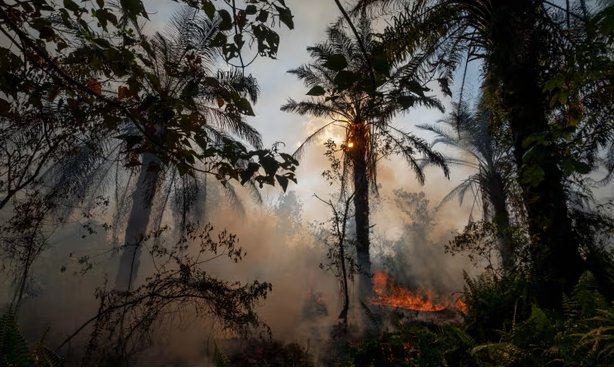May 21, 2025 | 10:27 GMT +7
May 21, 2025 | 10:27 GMT +7
Hotline: 0913.378.918
May 21, 2025 | 10:27 GMT +7
Hotline: 0913.378.918

Deforestation in Riau province, Indonesia, to make way for palm oil plantations. Photograph: NurPhoto/Getty Images
Beef, soy and palm oil products driving deforestation are still being imported into the UK, despite government promises this practice would end, data has revealed.
Campaigners have criticised the Department for Environment, Food and Rural Affairs (Defra) for failing to put practices in place to stop the import of goods from areas with high deforestation rates. This is despite the government having promised at the Cop26 climate conference in 2021 to implement the rules.
The Environment Act 2021 established a ban on the use of commodities produced on illegally deforested land abroad, but this has not come into force because Defra has failed to publish the list of the commodities covered by the regime.
The former environment minister Zac Goldsmith said: “We passed the Environment Act with much fanfare, not least so we could present ourselves as a world leader at Cop26 … and it was a genuinely landmark law to cut illegal deforestation caused by commodity production from our supply chains. But there has been virtually no progress since the law passed and not a single tropical tree has yet been saved.
“It should go without saying that there is no solution to climate change, indeed there is no future for our species, if we fail to halt the loss of the world’s great forests. So the government needs to stop with the delays and U-turns and get on with it.”
An investigation by Global Witness and Trase has found the UK is still importing seven commodities associated with deforestation including palm oil, soy and cattle products.
Of the estimated total 20,400 hectares (50,400 acres) of deforestation linked to UK imports between November 2021 and July 2023, 8,800 hectares were estimated to be linked to palm oil, 3,470 hectares to soy, and 2,950 hectares to cattle products.
The researchers said these numbers were likely to be underestimates because they included raw commodities rather than processed products that contained the ingredients, such as chocolate.
Campaigners also said the UK’s regime was weaker than that of the EU, which covered deforestation and forest degradation. The UK’s ban covers only illegal deforestation.
Veronica Oakeshott, the head of the forest campaign at Global Witness, said: “For two years, the government has been dithering about which deforestation-causing commodities to include in these regulations. In this time, tropical forests have continued to be destroyed to grow crops and graze cattle. And some of that product ends up for sale in the UK. This delay is tainting the UK public’s products – from the beef on our dinner plates to the palm oil in our shampoo.
She said the government should listen to UK retailers and fully align with the EU’s deforestation regulation, which covered all forest-risk commodities.
Oakeshott added: “It is outrageous that Defra is failing to press the green light on simple regulations needed to stop the UK importation of forest destruction. If the UK wants to be seen as climate leader, it must act now.”
A Defra spokesperson said: “The vast majority deforestation for commercial agriculture is conducted in violation of laws in producer countries, which is why our Environment Act includes world-leading due diligence legislation to help tackle this illegal activity and to rid these products from UK retail shelves. We will be setting out our next steps imminently.”
“Our approach is based on partnership with producer countries and will reinforce the efforts of governments in producer countries to ensure sustainable forest and land use.”
(The Guardian)

(VAN) Attempts to bring down the price of the Japanese staple have had little effect amid a cost-of-living crisis.

(VAN) Fourth most important food crop in peril as Latin America and Caribbean suffer from slow-onset climate disaster.

(VAN) Shifting market dynamics and the noise around new legislation has propelled Trouw Nutrition’s research around early life nutrition in poultry. Today, it continues to be a key area of research.

(VAN) India is concerned about its food security and the livelihoods of its farmers if more US food imports are allowed.

(VAN) FAO's Director-General emphasises the need to work together to transform agrifood systems.

(VAN) Europe is facing its worst outbreak of foot-and-mouth since the start of the century.

(VAN) The central authorities, in early April, released a 10-year plan for rural vitalization.